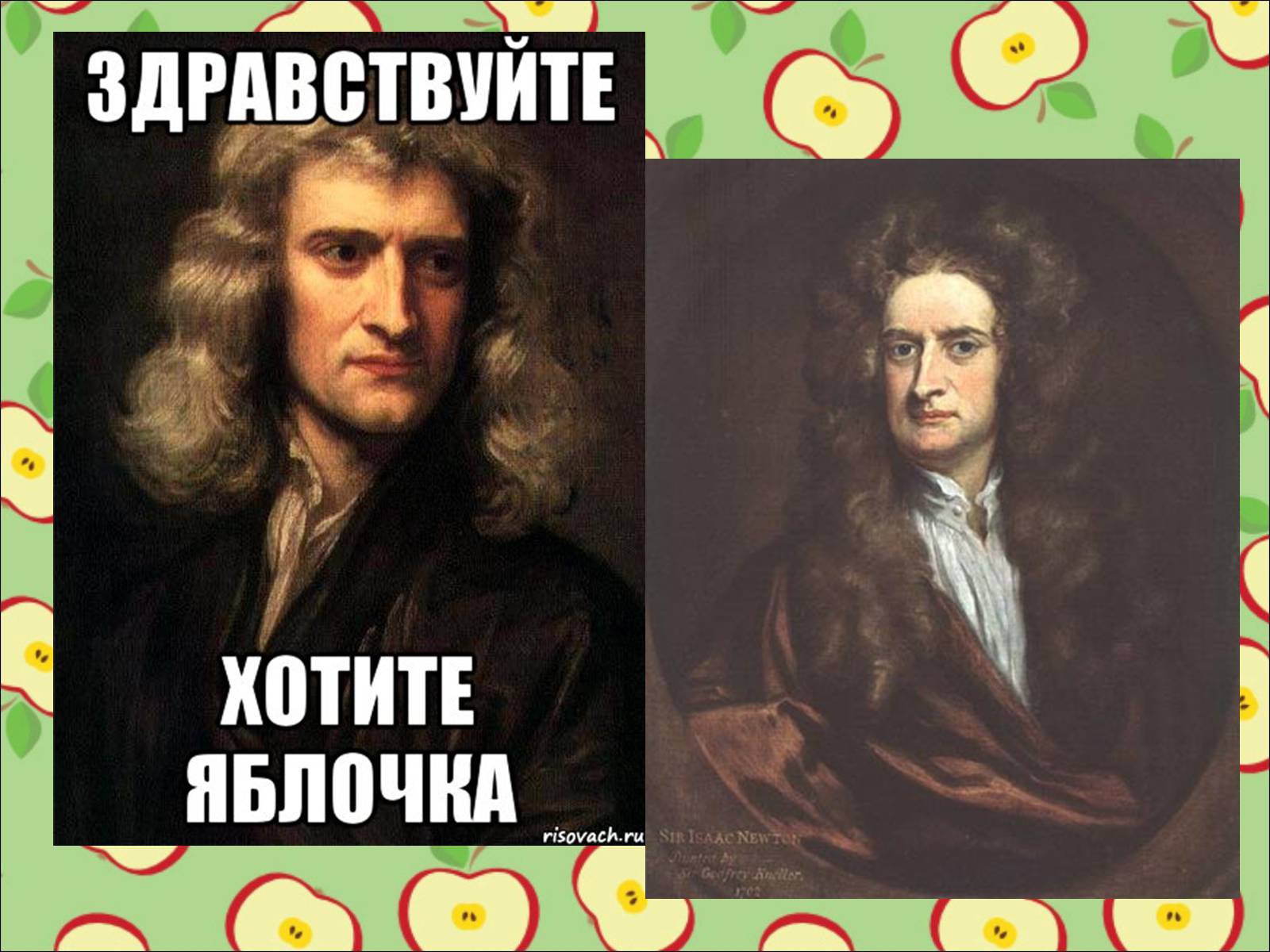- Головна
- Готові шкільні презентації
- Презентація на тему «Sir Isaac»
Презентація на тему «Sir Isaac»
189
Слайд #1
Sir Isaac
“Nature and Nature's laws lay hid in nightGod said ‘Let Newton be!'And all was light.”
- Alexander Pope
Newton
“Nature and Nature's laws lay hid in nightGod said ‘Let Newton be!'And all was light.”
- Alexander Pope
Newton
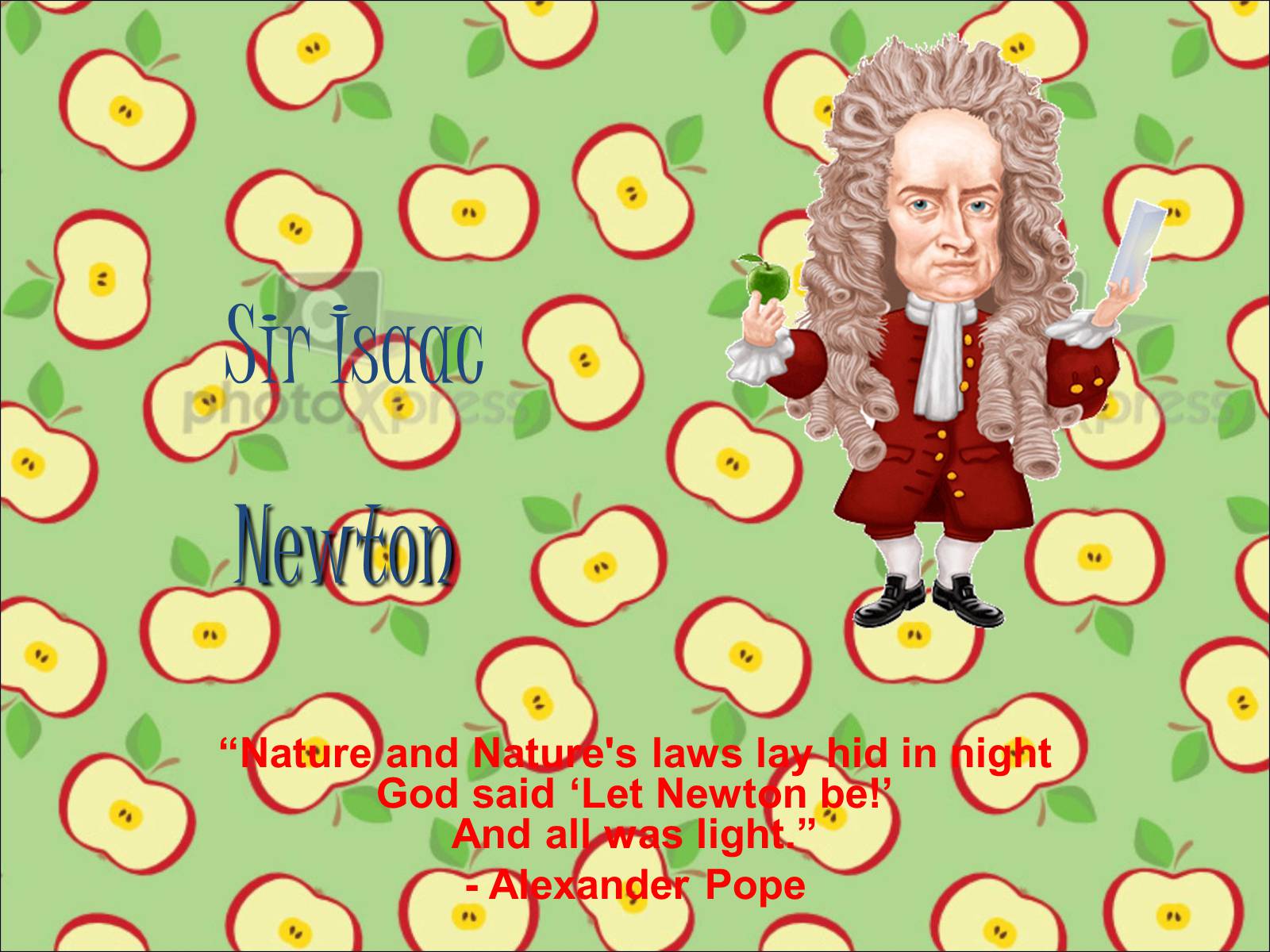
Слайд #2
His Formative Years
Born on December 25, 1642 (January 4, 1643) in Woolsthorpe, Lincolnshire, England
Raised by his grandparents
Pulled out of school at 14 to run the family farm
Wasn't good at farming, so they sent him back to school
The Newton residence, circa 1689
Born on December 25, 1642 (January 4, 1643) in Woolsthorpe, Lincolnshire, England
Raised by his grandparents
Pulled out of school at 14 to run the family farm
Wasn't good at farming, so they sent him back to school
The Newton residence, circa 1689
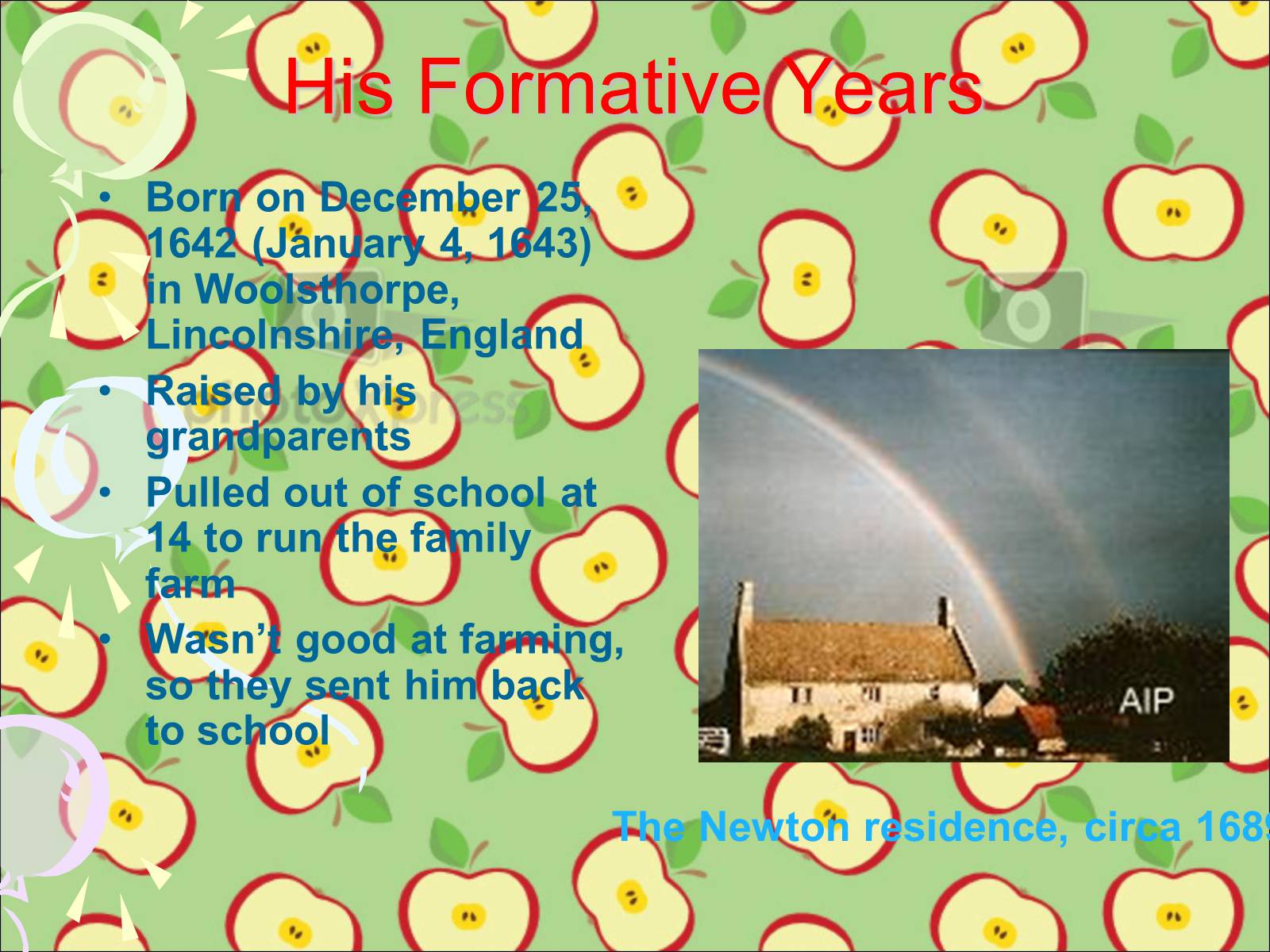
Слайд #3
Schooling
Entered Trinity College at Cambridge University at age 18 and began studying to become a minister
Graduated at age 23
Returned to the farm because of the Black Death
He got bored and ended up working on the binomial theorem, light, telescopes, calculus, and theology
Newton in about 1702
Entered Trinity College at Cambridge University at age 18 and began studying to become a minister
Graduated at age 23
Returned to the farm because of the Black Death
He got bored and ended up working on the binomial theorem, light, telescopes, calculus, and theology
Newton in about 1702
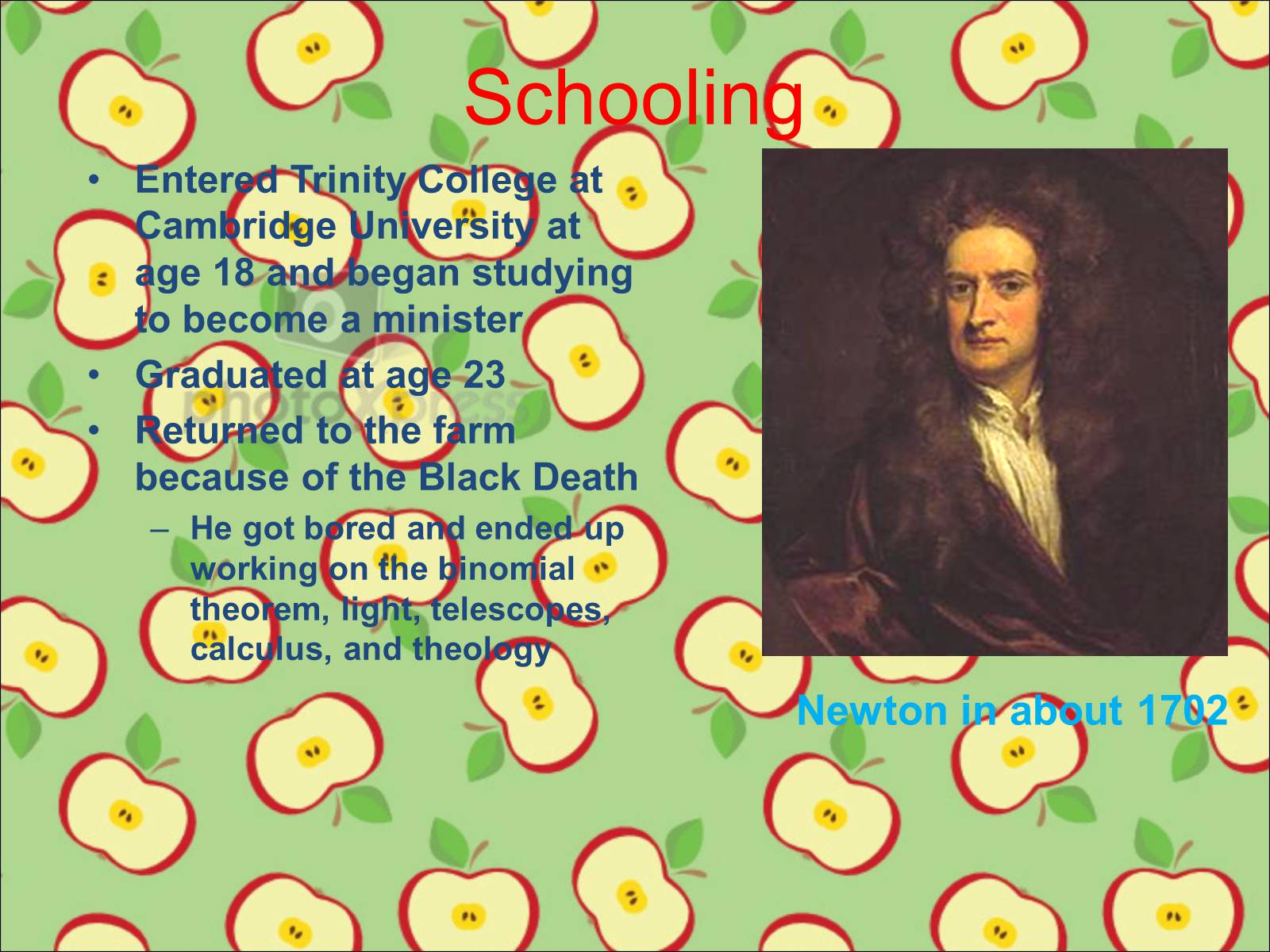
Слайд #4
Schooling
Entered Trinity College at Cambridge University at age 18 and began studying to become a minister
Graduated at age 23
Returned to the farm because of the Black Death
He got bored and ended up working on the binomial theorem, light, telescopes, calculus, and theology
Newton in about 1702
Entered Trinity College at Cambridge University at age 18 and began studying to become a minister
Graduated at age 23
Returned to the farm because of the Black Death
He got bored and ended up working on the binomial theorem, light, telescopes, calculus, and theology
Newton in about 1702
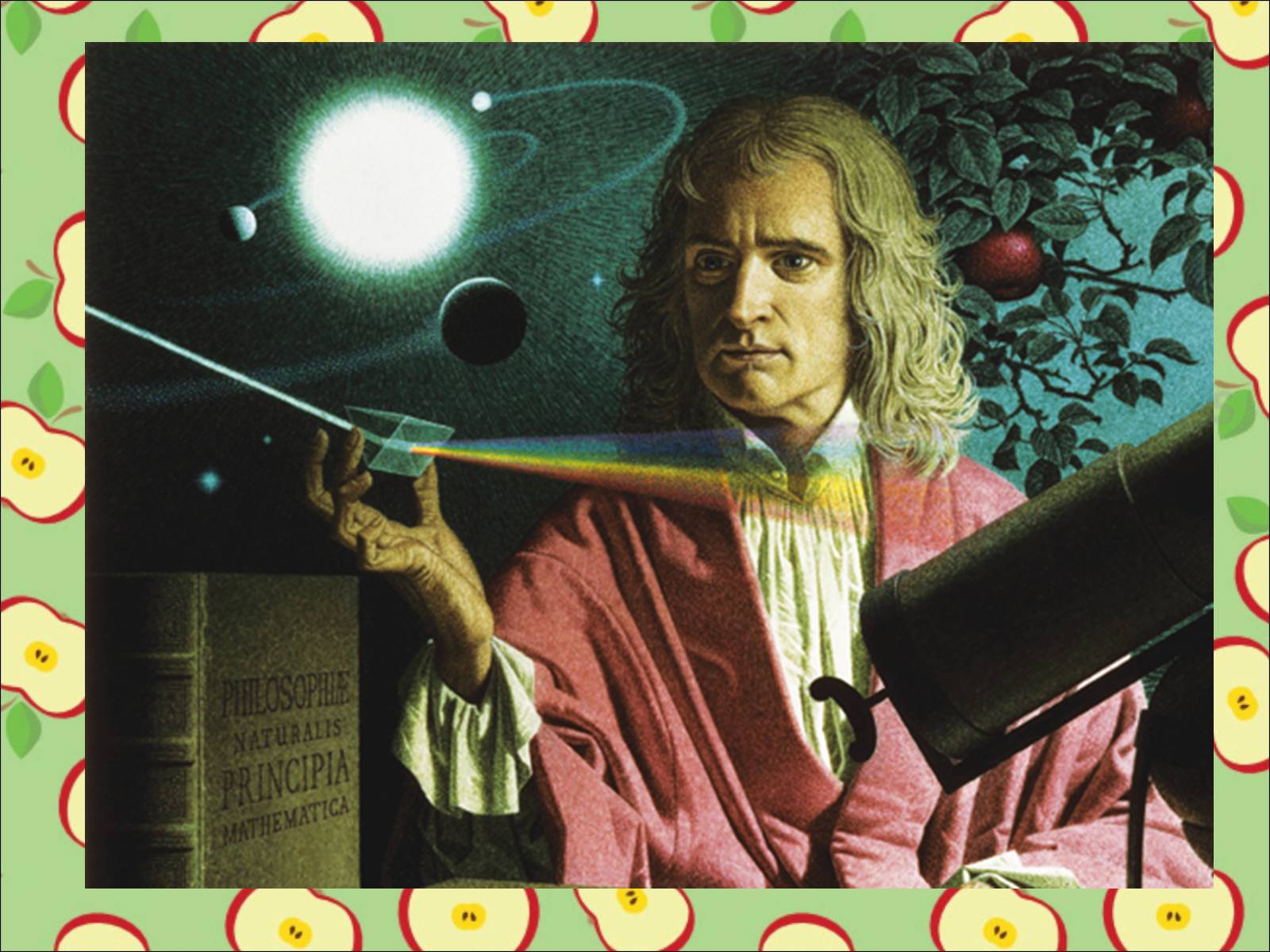
Слайд #5
Calculus
Started developing Calculus as early as 1666 but never really got around to publishing much
In about 1668, Wilhelm Leibniz began developing very similar ideas and published them before Newton's published his work
Arguing ensued
(Leibniz used dy/dx notation; Newton used ẏ)
Post-Modern Newton
Started developing Calculus as early as 1666 but never really got around to publishing much
In about 1668, Wilhelm Leibniz began developing very similar ideas and published them before Newton's published his work
Arguing ensued
(Leibniz used dy/dx notation; Newton used ẏ)
Post-Modern Newton
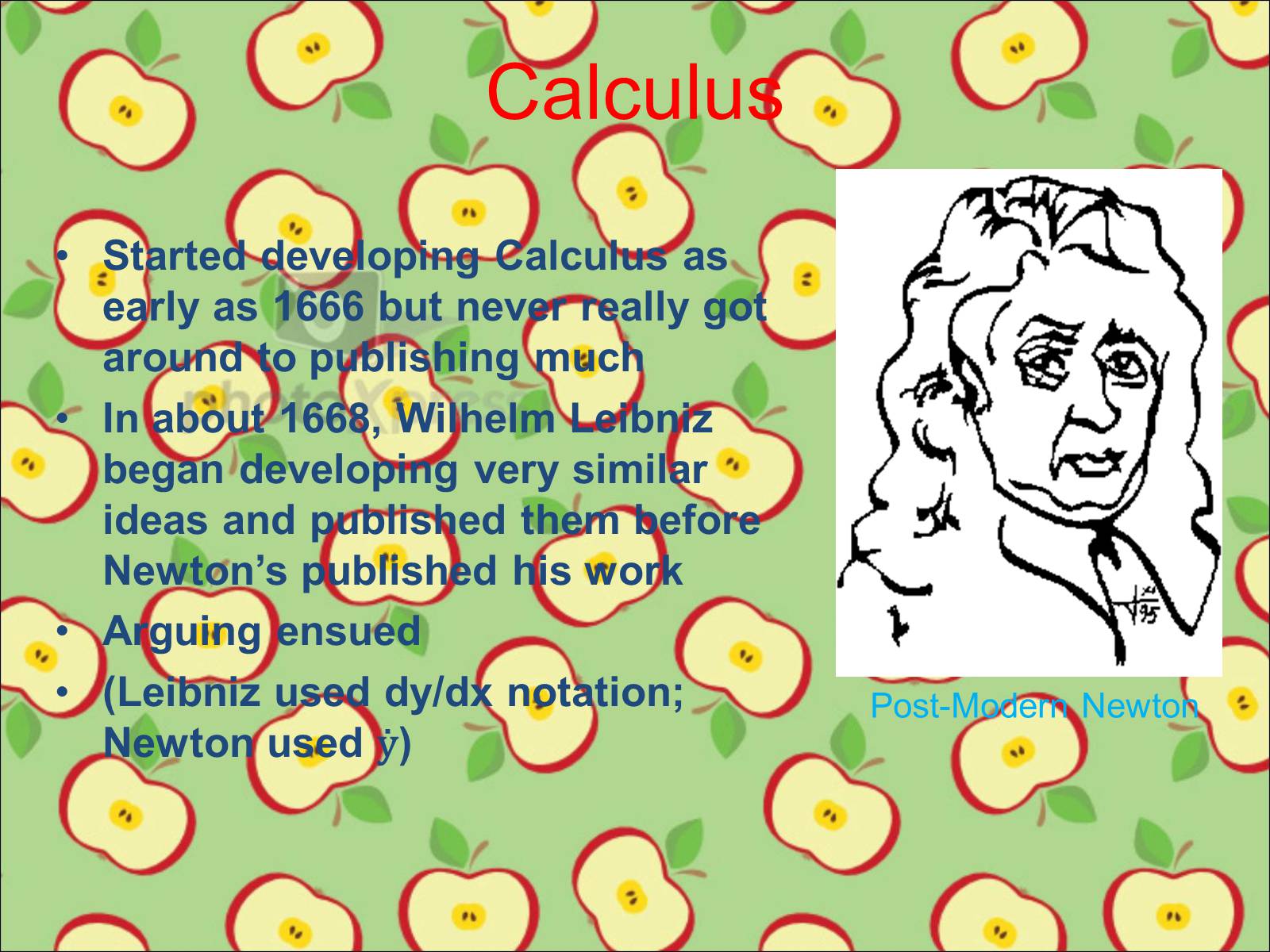
Слайд #6
Opticks
Discovered that light is made up of a spectrum of colors
Made the first telescope that used a curved mirror instead of lenses
Believed that light was made up of “corpuscles” rather than waves (Hooke and Huygens disagreed)
Didn't publish any of this until the after the death of Hooke in 1703
Newton in the Lab
Discovered that light is made up of a spectrum of colors
Made the first telescope that used a curved mirror instead of lenses
Believed that light was made up of “corpuscles” rather than waves (Hooke and Huygens disagreed)
Didn't publish any of this until the after the death of Hooke in 1703
Newton in the Lab
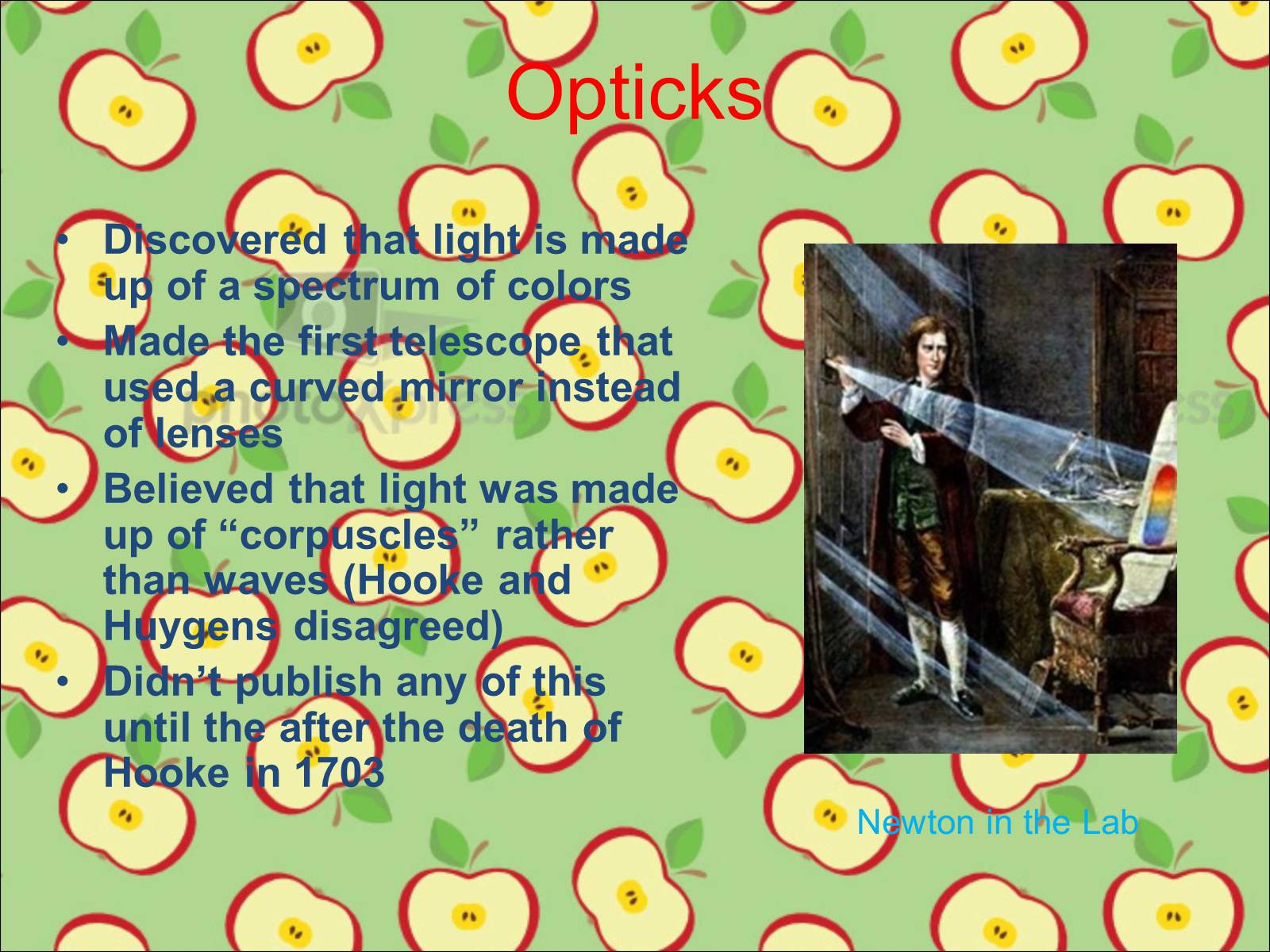
Слайд #7
Opticks
Discovered that light is made up of a spectrum of colors
Made the first telescope that used a curved mirror instead of lenses
Believed that light was made up of “corpuscles” rather than waves (Hooke and Huygens disagreed)
Didn't publish any of this until the after the death of Hooke in 1703
Newton in the Lab
Discovered that light is made up of a spectrum of colors
Made the first telescope that used a curved mirror instead of lenses
Believed that light was made up of “corpuscles” rather than waves (Hooke and Huygens disagreed)
Didn't publish any of this until the after the death of Hooke in 1703
Newton in the Lab
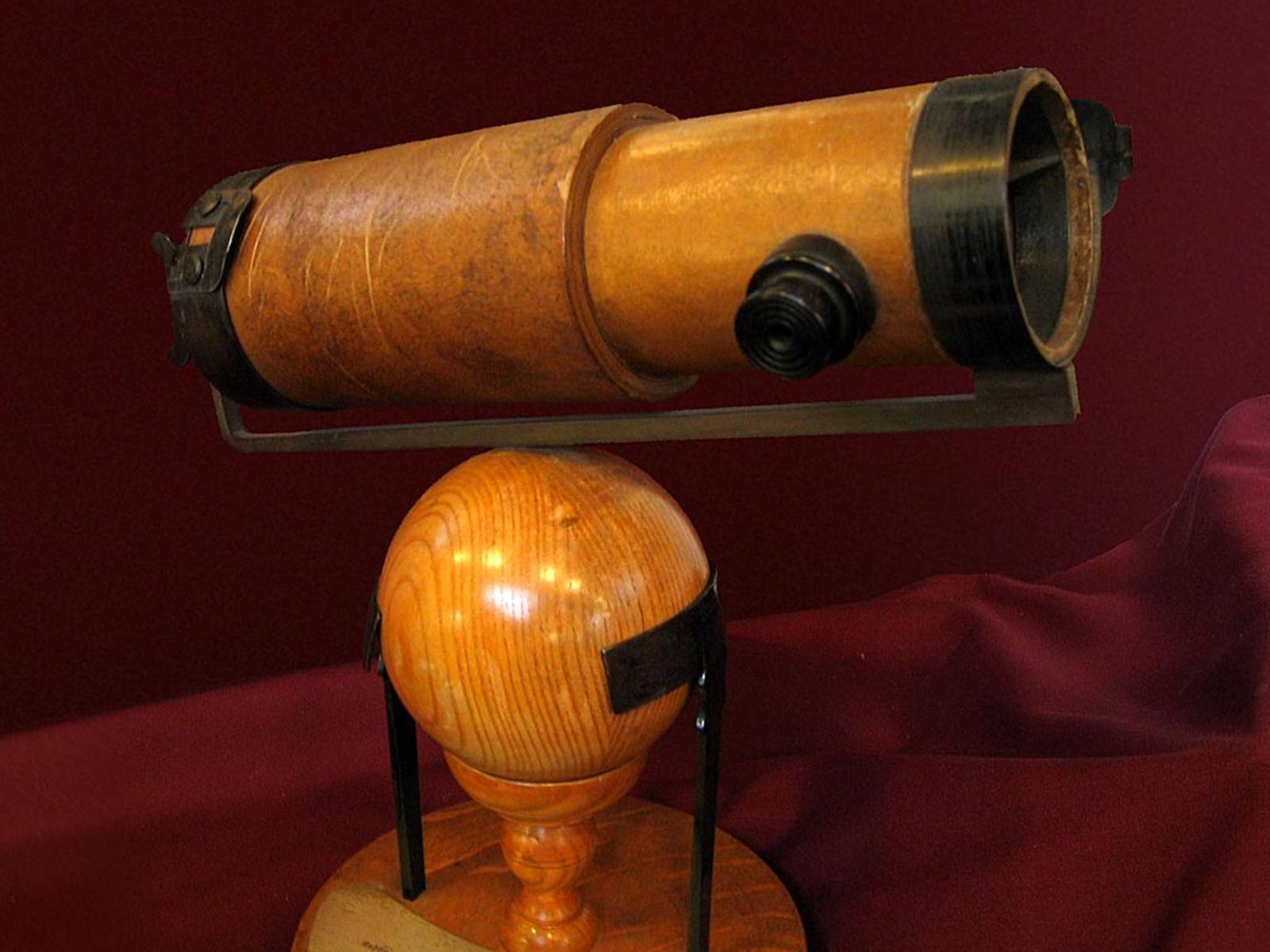
Слайд #8
Apples and Stuff
Formulated Newton's Laws
Proved that the force of gravity is inversely proportional to distance squared
After conquering gravity, motion and optics, decided to work on changing lead into gold
Formulated Newton's Laws
Proved that the force of gravity is inversely proportional to distance squared
After conquering gravity, motion and optics, decided to work on changing lead into gold
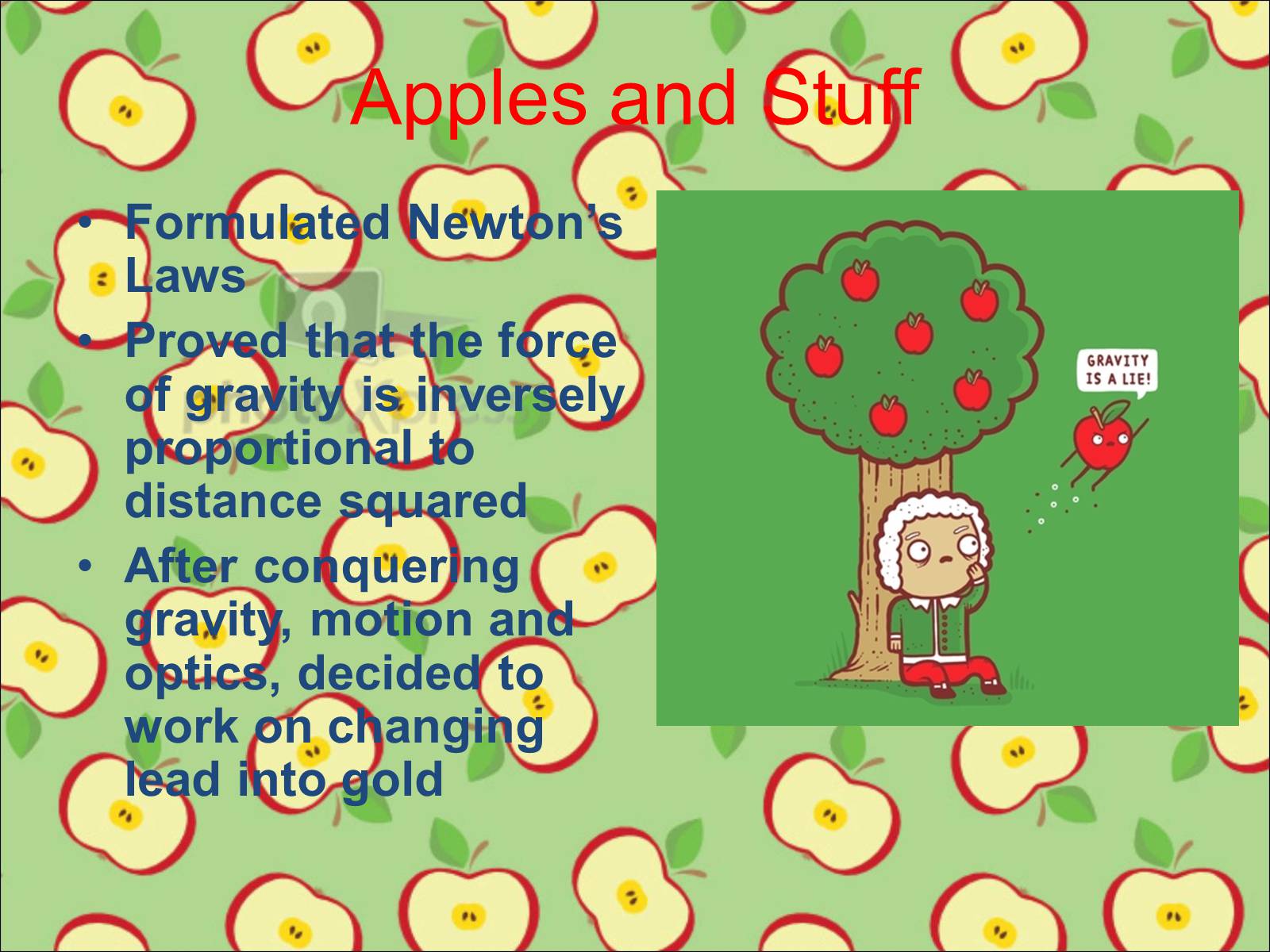
Слайд #9
Religious Views
Wrote a book about the fall of Christianity in the 4th Century A.D.
“This most beautiful system of the sun, planets, and comets, could only proceed from the counsel and dominion of an intelligent Being ... This Being governs all things ... as Lord of all. . . Atheism is so senseless. When I look at the solar system, I see the earth at the right distance from the sun to receive the proper amounts of heat and light. This did not happen by chance.”
His religious ideas got him in trouble because he taught at a church-run university
Wrote a book about the fall of Christianity in the 4th Century A.D.
“This most beautiful system of the sun, planets, and comets, could only proceed from the counsel and dominion of an intelligent Being ... This Being governs all things ... as Lord of all. . . Atheism is so senseless. When I look at the solar system, I see the earth at the right distance from the sun to receive the proper amounts of heat and light. This did not happen by chance.”
His religious ideas got him in trouble because he taught at a church-run university
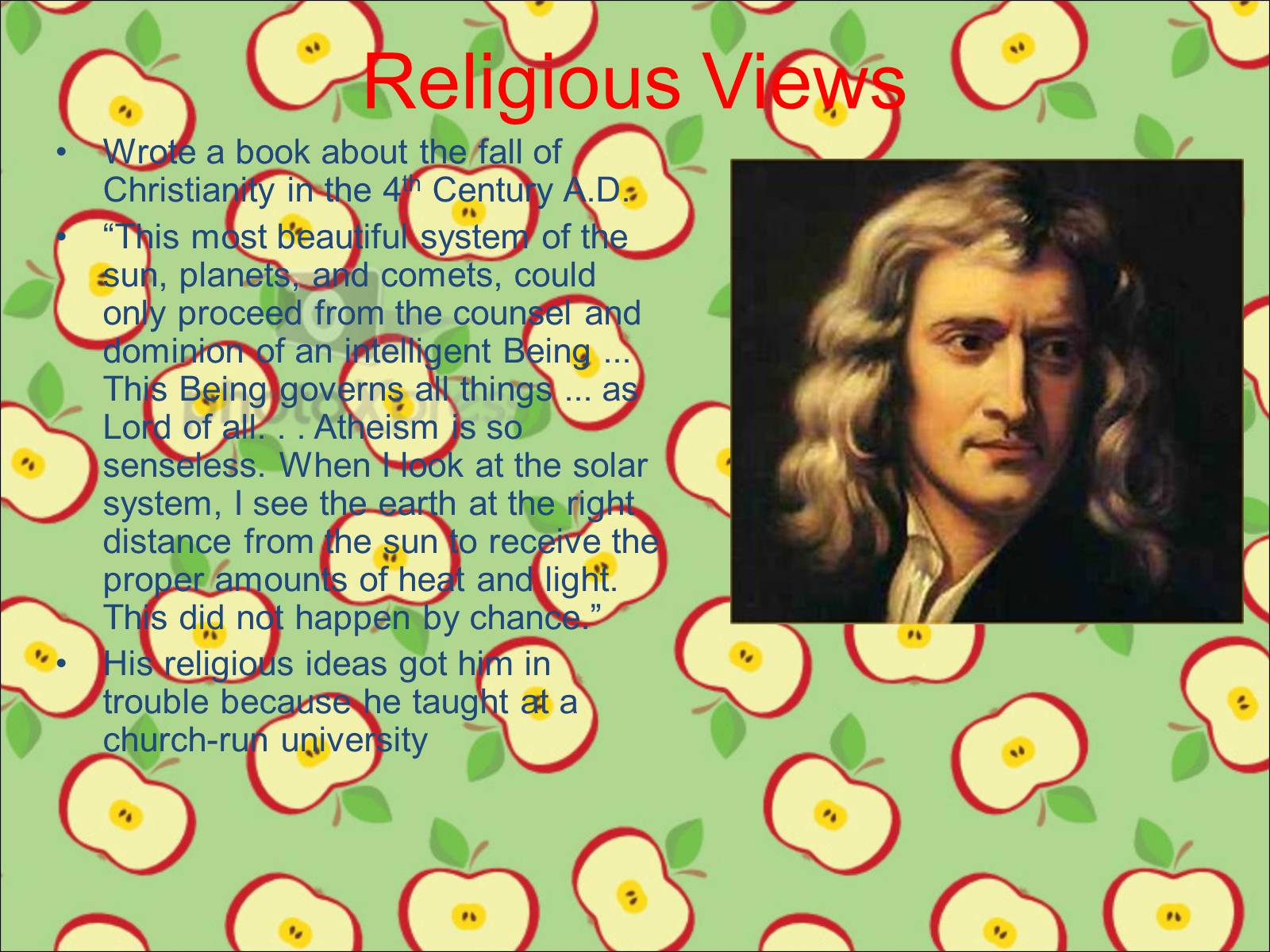
Слайд #10
Newtonian Trivia
Became Master of the Royal Mint in 1699
First scientist to be knighted for his work (1708)
Elected President of the Royal Society every year from 1703 to 1727
Member of Parliament (1689-1690)
Died in 1727
Became Master of the Royal Mint in 1699
First scientist to be knighted for his work (1708)
Elected President of the Royal Society every year from 1703 to 1727
Member of Parliament (1689-1690)
Died in 1727
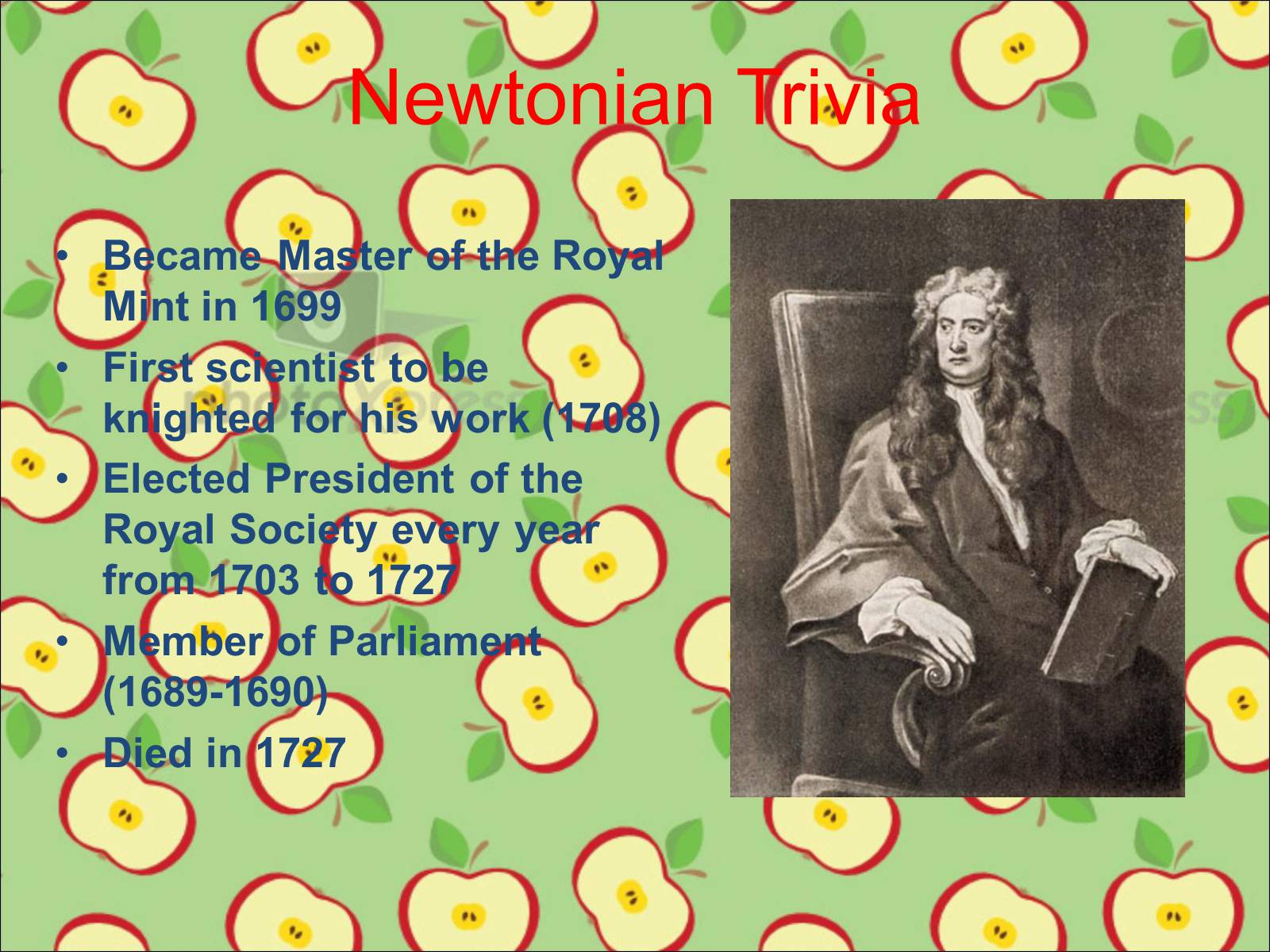
Слайд #11
“I do not know what I may appear to the world, but to myself I seem to have been only like a boy playing on the sea-shore, and diverting myself in now and then finding a smoother pebble or a prettier shell than ordinary, whilst the great ocean of truth lay all undiscovered before me.”
- Isaac Newton
- Isaac Newton
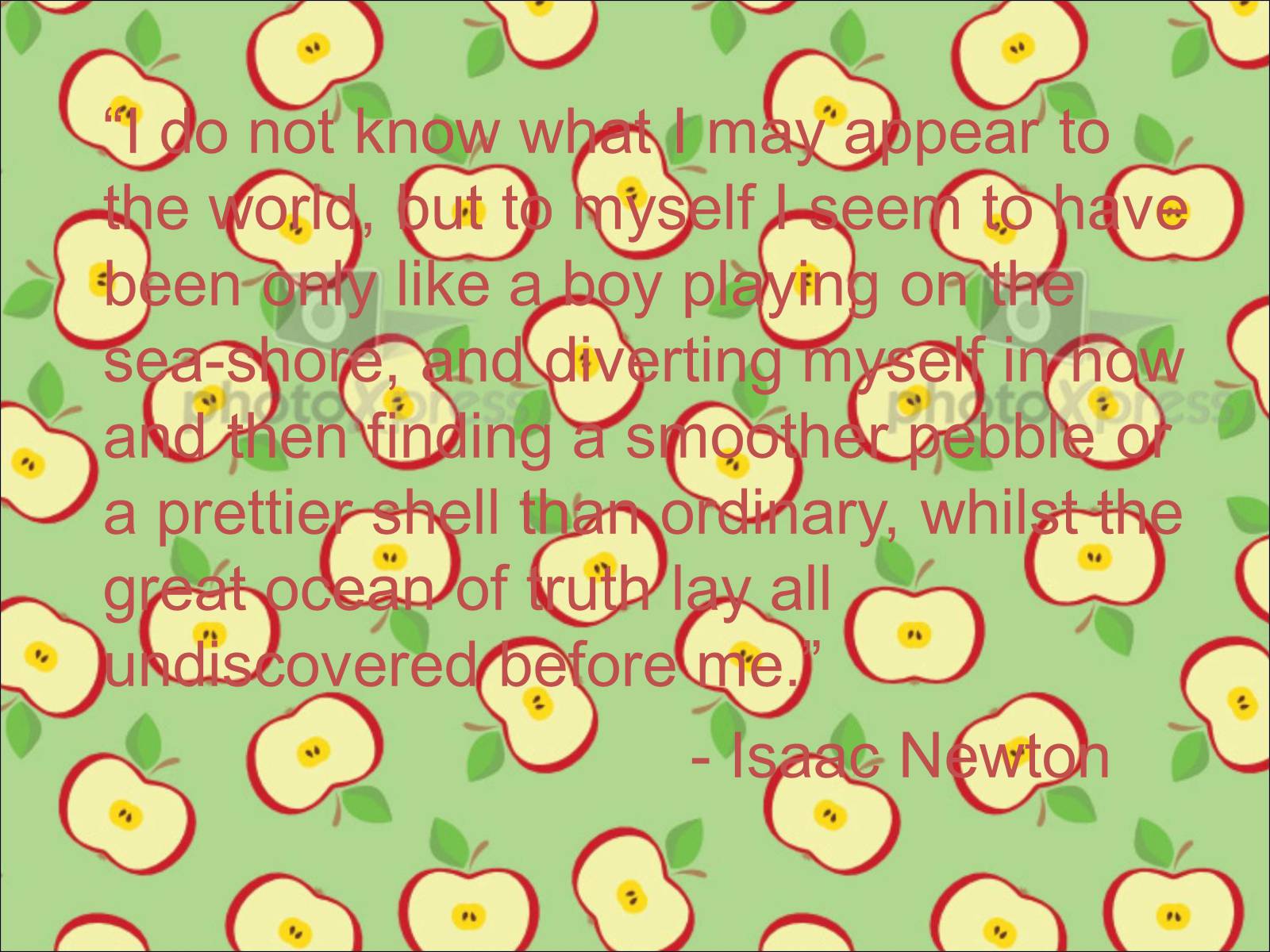
Слайд #12
